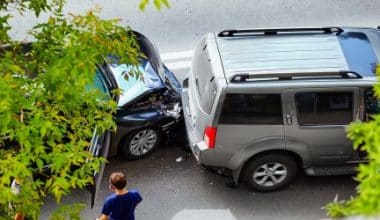PLPD is an abbreviation that is frequently used in car insurance. Although it’s useful to know that “PLPD” refers to “Personal Liability and Property Damage,” it’s another thing entirely to understand why that’s so. If you are familiar with this type of coverage, you can better protect yourself in the event that another driver is at fault for an accident. This knowledge will also help you understand your own insurance options. In this article, we will discuss the cheapest PLPD insurance in Michigan, how it works, and PLPD insurance in MT Pleasant, MI.
What Does PLPD Mean in Insurance?
PLPD stands for “Public Liability and Property Damage,” which is a type of basic car insurance coverage. It provides coverage for the liability of the insured party in case they cause injury or damage to another person’s property while operating their vehicle.
The “public liability” component of PLPD insurance covers the insured’s legal liability for bodily injury or death of a third party, such as pedestrians or passengers in other vehicles, resulting from an accident for which the insured is at fault. It also covers legal defence costs in case the insured is sued for such claims.
The “Property Damage” component covers the insured’s legal liability for damage to another person’s property, such as their vehicle, fence, or home, caused by an accident where the insured is at fault. This coverage helps pay for the repair or replacement of the damaged property.
PLPD insurance is often the minimum coverage required by law in many states and jurisdictions. It is a basic and essential insurance option for drivers, offering financial protection and legal coverage in the event of accidents. However, it’s important to note that PLPD insurance only covers damages to others, not the insured’s own vehicle or medical expenses.
How Does PLPD Insurance Work?
Most places require personal liability and property damage (PLPD) insurance, which gives victims of your negligence some assurance that they will receive compensation for their losses.
The at-fault party will make a claim with their insurer after the collision. Furthermore, this can be done through the insured’s own insurance provider, which will then handle collecting payment from the liable party’s policyholder. You could also try getting in touch with the insurance provider for the negligent driver. This option may be more appealing in cases where the innocent driver was operating a rented vehicle or wasn’t even in control of a vehicle (such as when a pedestrian was struck). Claim settlements in all scenarios are handled by the liability insurance of the negligent driver.
The bodily injury section of a liability policy covers all expenses related to treating injuries sustained in the accident. It might pay for things like lost wages if necessary. Damage to the car or other fixed physical property, such as a fence or a building, is covered under the liability policy’s property damage coverage.
In addition, there is a maximum payout specified in the insurance contract for both types of coverage. Insurance with limits of $250, $500, or $250, for instance, provides coverage of up to $250,000 per person. A maximum of $500,000 per injured person and $250,000 per damaged property would be paid out.
Over and above such maximums, the negligent party would be on the hook for any additional medical costs and property repairs.
What Does PLPD Insurance Cover?
PLPD insurance, which stands for Public Liability and Property Damage Insurance, covers two main areas:
#1. Public Liability
PLPD insurance covers the insured’s legal liability for bodily injury or death of a third party, such as pedestrians, passengers in other vehicles, or occupants of other vehicles, resulting from an accident for which the insured is at fault. It includes medical expenses, lost wages, pain and suffering, and legal defence costs if the insured is sued for causing injuries to others in an accident.
#2. Property Damage
In the event that the insured is at fault for an accident that results in damage to another person’s property, PLPD insurance will cover the insured’s legal liability. This can include damage to vehicles, fences, buildings, or other types of property. The insurance helps pay for the repair or replacement of the damaged property.
It’s important to note that PLPD insurance does not cover the insured’s own car or personal injuries. It provides basic coverage for the liabilities the insured may face in accidents involving other people’s property or injuries to others. Drivers often choose PLPD insurance as a minimum legal requirement to operate a car, but it may not provide sufficient coverage for all situations, so individuals may opt for additional coverage options for more comprehensive protection.
When Should You Get PLPD Insurance?
You should consider getting PLPD (Public Liability and Property Damage) insurance when you want to meet the minimum legal requirements for car insurance in your state or jurisdiction. Many states mandate drivers to have a basic level of liability insurance, which PLPD insurance fulfills. If you’re operating a vehicle, it’s essential to comply with these legal requirements to avoid fines, penalties, or legal consequences.
PLPD insurance is a good option for individuals with older cars that may not have a high market value. In such cases, the cost of comprehensive or collision coverage might not be justified, making PLPD a more affordable choice that provides basic liability protection.
However, it’s crucial to assess your individual needs and financial situation. If you have a newer or more valuable vehicle, or if you want coverage for your own car’s damage and your medical expenses in case of an accident, you might want to consider additional coverage options beyond PLPD insurance. Comprehensive and collision coverage can provide more extensive protection for your car, although they come at a higher cost than basic PLPD insurance.
Ultimately, your decision to get PLPD insurance or opt for more comprehensive coverage depends on your budget, the value of your vehicle, and your willingness to assume the financial risk in case of an accident. Consulting with an insurance agent can help you make an informed decision based on your specific circumstances.
PLPD Insurance in Michigan
In Michigan, PLPD stands for Public Liability and Property Damage Insurance. It is the minimum level of car insurance coverage required by law for drivers in the state. PLPD insurance covers the insured’s legal liability for bodily injury or death of a third party, as well as property damage caused in an accident where the insured driver is at fault.
Michigan’s PLPD insurance requirements include specific minimum coverage limits. The minimum coverage limits for PLPD insurance in Michigan were $20,000 for bodily injury or death per person, $40,000 for bodily injury or death per accident, and $10,000 for property damage per accident.
It’s important for Michigan drivers to obtain at least this minimum coverage to comply with state law. However, it’s advisable to consider additional coverage options beyond PLPD insurance for more comprehensive protection. Michigan is a no-fault insurance state, which means that drivers’ own insurance policies typically cover their medical expenses and property damage, regardless of who is at fault in an accident. Understanding the state’s unique insurance laws and consulting with insurance providers can help drivers make informed decisions about their coverage options. Please note that these details might have changed since my last update, so it’s essential to check the most recent regulations from the Michigan Department of Insurance and Financial Services for accurate and current information
What Does PLPD Insurance in Michigan Cover?
In order to qualify for Michigan’s basic no-fault insurance, drivers must have:
#1. Personal Injury Protection or PIP
The insured will get the following benefits under the no-fault policy:
- Have their medical bills covered completely
- Receive compensation equal to 85% of lost wages (the limit for lost income is adjusted annually).
- Replacement services for everyday household needs, up to $20
#2. Property Protection Insurance or PPI
If the insured causes damage to someone else’s property that isn’t an automobile, the PLPD no-fault coverage will pay up to $1 million.
Structures, walls, and parked vehicles all fall into this category.
#3. Residual Liability Insurance or Bodily Injury and Property Damage
The no-fault law protects insured people from lawsuits filed by third parties as a result of an auto accident.
But there are the odd cases:
- There was negligence, and as a result, someone was “killed, seriously injured, or permanently disfigured.”
- Accident with a driver who is not a Michigan resident; their vehicle is not registered in Michigan
- Hit by a car while visiting another state
- If you cause damage to another person’s vehicle and are determined to be at fault in an accident in which they are also at least partially at fault, you must carry liability insurance or face
To the extent that you are held legally liable, your no-fault PLPF insurance will pay for the damages. Though drivers can opt for more comprehensive policies, the bare minimum includes:
- Up to $20,000 per person injured or killed in an accident
- Up to $40,000 per accident if multiple people are injured or killed
- Up to $10,000 for property damage (in another state)
What Isn’t Covered With PLPD Insurance in Michigan?
What Michigan’s PLPD insurance does not cover is as follows:
#1. Collision and Comprehensive Insurance
Standard PLPD insurance in Mount Pleasant, Michigan, does not cover collision repairs.
If an accident causes damage to your car, your no-fault insurance won’t pay for the repairs. When correctly parked, however, and damaged by another vehicle, the insured will be compensated.
Collision Insurance
When your car is not damaged in an accident, you will pay to have it fixed. The three categories of collision insurance are limited, standard, and broad. Also, read COLLISION INSURANCE: What Is It & What Does It Cover?
Comprehensive Insurance
If your car is stolen or destroyed in any way, the following will be covered by your insurance policy:
- Falling object
- Animal collision
- Fire, flood, vandals
If you drive a car that is older, you can get by with just the bare minimum of PLPD insurance coverage. However, collision and comprehensive coverage may be obligatory if your automobile is financed.
#2. Limited Property Damage Liability Insurance or Mini Tort
If you were even partially at fault in a collision, you might be held financially responsible for the other driver’s deductible.
Mini-tort property damage coverage limits are often set at $3,000. If an insured driver causes property damage, your insurance company will pay up to that amount.
#3. Towing and Rental Car Coverage
Some insurance companies offer this as an additional layer of security. In the event of a flat tyre, accident, or car breakdown, the costs of towing and/or a rental car will be covered or reimbursed.
Now that you know what to expect from PLPD insurance and its limits, you can begin shopping around for the policy that best suits your needs.
What Is the Average Cost of PLPD Insurance in Michigan?
The typical premium for PLPD (Personal Liability and Property Damage) insurance in Michigan is $1,880 per year. PLPD may imply something different in each state; however, in Michigan, it refers to the minimum level of legally necessary insurance. Hence, PLPD denotes the combined minimum limits of PIP, PPI, and BI/PD coverage required by law in a certain state.
Cheapest PPLD Insurance in Michigan
Full-coverage car insurance may be more expensive for Michigan drivers, but it can help them avoid financial hardship after an accident. Even though LLPDs are more expensive than minimal coverage policies, the following companies provide cheap insurance options, with Secura providing the lowest rates.
#1. Travelers
Auto insurance for Travelers is available in 49 states, plus Michigan. When we entered our Michigan driver information into Travelers’ online quote tool, we noticed that we could get LLPD insurance coverage for as cheap as $7.17 per month. Besides auto insurance, Travelers also provides policies for your home, apartment, boat, RV, and motorcycle.
#2. Secura
Secura is an LLPD car insurance company that serves ten states in the Midwest and Southwest, including Michigan. The minimum cost of our basic coverage policy for our Michigan driver is only $15.02 per month. You can save money by bundling your home and car insurance with this company’s Milestone coverage.
#3. Wolverine Mutual
PLPD car insurance coverage is available from Wolverine Mutual to drivers in both Michigan and Indiana. Rates on basic auto insurance coverage in Michigan could be as low as $25.50 per month for drivers who match our description. Anyone interested in a price estimate should get in touch with a free agent. Wolverine Mutual also provides coverage for homes, motorcycles, boats, and recreational vehicles.
#4. USAA
Exclusively available to service personnel and their families, USAA provides basic auto insurance for as little as $37 a month for Michigan drivers who match our typical driver. USAA provides a wide variety of insurance policies, including those for renters, homeowners, motorcyclists, and recreational vehicles, and consistently scores near the top in J.D. Power’s annual customer satisfaction rankings.
PLPD Insurance MT Pleasant, MI
If you want tailored insurance solutions, independent firms are your best bet. These brokers have relationships with numerous insurers, allowing them to help customers choose policies that are a good fit.
Independent insurance brokers have the advantage of knowing about products, claims, and discounts that may not be readily apparent if you were to conduct your own study into the various insurance companies and their offerings.
Depending on an independent insurance agency, such as SWITCH Insurance Company, to shop around for the best insurance prices in Mt. Pleasant can be a time- and effort-saving option.
With over 3,000 satisfied customers, SWITCH Insurance Group has been in business for over a decade.
SWITCH Insurance has partnered with dozens of Michigan’s best-rated insurers. With its competent team of 10 insurance professionals, all clients are guaranteed to get unique solutions for all their needs.
SWITCH Insurance provides a variety of auto insurance plans as well as riders that can be added to your policy.
- PLPD Inc. or liability coverage
- Comprehensive Coverage
- Collision Coverage
- Uninsured or Underinsured Motorist coverage
- Medical Payments coverage
- Personal Injury Insurance
SWITCH provides a number of optional extras to further customize your insurance plan. This is so because only meeting the minimum insurance standards is not enough for you. We suggest exploring these alternatives to ensure your safety and financial security in any circumstance:
- Roadside Assistance
- Gap Coverage
- Rental Car Reimbursement
The staff will assist you in determining the appropriate level of insurance coverage based on factors such as your age, the age of your car, and your driving record.
SWITCH Insurance is an independent insurance agency that strives to simplify the process of locating competitive insurance quotes and coverage options for their customers. That’s why they went ahead and developed a web-based insurance estimator.
What Is the Difference Between Full Coverage and PLPD?
The main difference between full coverage insurance and PLPD (public liability and property damage) insurance lies in the extent of coverage they provide.
Full-coverage insurance typically includes several components beyond what PLPD offers. It consists of liability coverage (which is similar to PLPD and covers bodily injury and property damage that you may cause to others), collision coverage (pays for repairs to your own vehicle after an accident, regardless of fault), and comprehensive coverage (protects your vehicle from non-collision events like theft, vandalism, natural disasters, and animal damage). Full coverage insurance also often includes additional options like medical payments coverage and uninsured or underinsured motorist coverage, offering more comprehensive protection for you and your vehicle.
On the other hand, PLPD insurance only offers the minimal liability protection required by law, which covers your legal responsibility for any injuries or property damage you cause to others. It does not cover your own vehicle’s damage or your medical expenses in the event of an accident.
Choosing between full coverage and PLPD depends on factors such as the value of your vehicle, your budget, and your willingness to assume financial risk. Full coverage offers more comprehensive protection, but it comes at a higher cost, while PLPD is a more affordable option that meets the minimum legal requirements.
How to Get Cheapest PLPD Insurance in Michigan
Finding the cheapest PLPD (Public Liability and Property Damage) insurance in Michigan can vary widely based on individual factors such as your driving history, age, the type of vehicle you drive, and your location within the state. Different insurance companies may offer different rates for the same coverage because insurance premiums are dependent on a number of factors.
To find the cheapest PLPD insurance in Michigan, it’s recommended to:
#1. Shop Around
Obtain quotes from multiple insurance companies to compare prices. Different insurers may offer varying rates and discounts, so shopping around allows you to find the most affordable option for your specific situation.
#2. Consider Discounts
Inquire about available discounts. Insurance companies often offer discounts for safe driving records, multiple policies (such as bundling auto and home insurance), anti-theft devices, or completing defensive driving courses.
#3. Review Coverage Options
While PLPD insurance provides basic coverage, it’s essential to understand the terms and conditions. Some policies might include additional benefits or coverage options at a slightly higher cost, so evaluate your needs and budget to determine the best balance between coverage and affordability.
#4. Maintain a Good Driving Record
Your driving history significantly influences insurance premiums. Avoid accidents and traffic violations to maintain a clean driving record, which can help you qualify for lower insurance rates.
#5. Consider Higher Deductibles
Opting for a higher deductible means you’ll pay more out of pocket in the event of a claim, but it can lower your premium costs.
By considering these factors and obtaining quotes from multiple insurance providers, you can find the cheapest PLPD insurance policy that meets your needs in Michigan. Remember to review any policy carefully to ensure it provides the necessary coverage for your situation.
Does PLPD Worth It?: Bottom Line
Whether PLPD insurance is worth it depends on your specific circumstances. If you have an older vehicle with a low market value and you’re looking for the minimum legal coverage, PLPD might be a cost-effective option. It provides the basic liability protection required by law, but it won’t cover your own vehicle’s damage or medical expenses in an accident.
However, if you have a newer or more valuable vehicle, investing in additional coverage like collision and comprehensive insurance might be worthwhile to protect your investment. Similarly, if you have significant assets to safeguard, opting for higher liability coverage beyond PLPD could be a prudent choice. Assess your financial situation and the value of your assets to determine the level of coverage that suits your needs best.
Frequently Asked Questions
When should you remove full coverage on your car?
When your car depreciates dramatically and the cost of coverage exceeds its value, think about removing full coverage. It’s also advisable if you have substantial savings to cover potential repairs or replacements. Evaluate your car’s value, financial situation, and risk tolerance to make an informed decision.
Do you really need full coverage?
No state mandates the purchase of full-coverage auto insurance. Most states require basic liability insurance, which covers people you hurt but not your own medical costs or car repairs. Beyond the minimum requirements of your state, full coverage provides additional financial security in the event of an accident.
Similar Articles
- BEST HOMEOWNERS INSURANCE IN MICHIGAN FOR 2023
- BEST RENTERS INSURANCE IN MICHIGAN 2023
- Pet Insurance in Michigan: Best of 2023
- Business Car Insurance: What Is It, How It Work & Best Optons






